
Choosing the right electric radiator for your home is more than just a matter of aesthetics or immediate budget; it’s about long-term comfort, efficiency, and even cost-savings. The right radiator can efficiently and comfortably heat your space, reduce energy bills, and offer the kind of convenient control that suits your lifestyle. But with so many options available, how do you know which one is the best fit for you?
From understanding the importance of high-quality insulation to the significance of kilowatt ratings and selecting the most appropriate thermostat, we’ll walk you through some crucial factors about electric heating systems that you should consider before making your purchase. We’ll also delve into maintenance tips and the benefits of seeking an expert opinion, so you can be confident that you’re making a wise investment for your home’s heating needs.

When it comes to a more energy-efficient heating strategy, the term “insulation” is crucial, especially if you are transitioning from traditional central heating systems, like gas central heating, to an electric heating solution. High-quality insulation slows down heat energy loss, ensuring that the heat from your electric radiators remains where you need it—inside your home.
Insulation refers to materials that slow down the transfer of heat. These materials can be integrated into the walls, floors, and ceilings of your home, effectively acting as a barrier that retains heat indoors and prevents cold air from entering. The significance of good insulation can’t be overstated. Without it, you’ll find that the heat generated by your electric radiator dissipates more quickly, essentially leaking out of your home. This means your radiator has to work harder and for longer periods to maintain the desired temperature, resulting in higher energy consumption and, inevitably, higher heating bills too.
When paired with high-quality insulation, electric radiators become incredibly cost effective at maintaining a warm, comfortable environment. The heat generated is retained within the space, allowing the radiator to operate more efficiently and in turn reducing your running costs.
This efficiency is measured in terms of the kilowatt-hour (kWh), a unit you’ll encounter as you explore electric heating options. Because the radiator has to work less to sustain the same level of warmth, you’ll see tangible benefits in the form of reduced energy bills. Plus, efficient insulation extends the lifespan of your electric radiator by reducing the wear and tear that comes from constant use.

One of the primary differences between electric and other forms of heating is the source of the heat. With electric heating, there are no flames, no fumes, and no need for a flue or chimney. They convert electrical energy directly into heat through a heating element and distribute this heat throughout your living space. This makes it an ideal choice for homes where installing gas lines or ventilation systems is impractical or undesired. In terms of efficiency, modern electric radiators are designed to maximise energy use, converting almost 100% of the electrical energy into heat.
When shopping for an electric radiator, you’ll often encounter the term ‘kilowatt’ or ‘kW’, a unit of power that describes the radiator’s heating output. Simply put, a 1kW electric radiator would consume 1 kilowatt-hour (kWh) of electricity to produce a certain amount of heat in an hour. Understanding this unit is crucial for several reasons:
Sizing: Knowing the kilowatt rating helps you choose a radiator appropriately sized for your space. Too small, and it won’t heat the room effectively; too large, and you’re wasting energy and money.
Energy Efficiency: The kW rating allows you to compare the energy efficiency of different models, helping you make an informed decision on a unit that offers the best balance of heat output and energy consumption.
Cost Estimation: Understanding the kW rating can also help you estimate ongoing operational costs, allowing for a more accurate budgeting of your heating expenses.
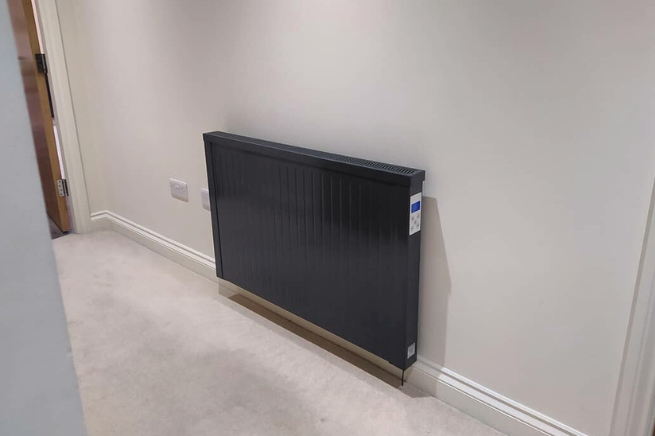
Your electric radiator ranges in efficiency and style, but each is designed to integrate seamlessly with your existing electrical system. Whether choosing soapstone core, clay core, or ceramic core radiators, electric radiators provide a maintenance-free heating option, harnessing their thermal properties to distribute heat evenly. Electric radiators offer an alternative to the traditional central heating approach, focusing on direct heat transfer to the surrounding air.
Whether you’re considering an oil-filled radiator or our sleek electric radiators, it’s essential to understand how electric radiators work. Unlike central heating systems that often rely on burning fossil fuels to generate warm air, electric radiators use either convection or radiant heat, or both to warm a space. This distinction is crucial for homes looking to move away from fossil fuels like natural gas and towards renewable energy sources.
Electric radiators use grid electricity, but many models now come with energy-saving features such as programmable timers and open window detection, helping to save energy that would otherwise be wasted. For those interested in going off grid, we have created a Zebra solution, which makes going of grid black and white. The Zebra solution pairs the NEOS electric radiator, VSL solar panels, the Sunsynk battery, and the Mixergy water tank to take you completely off grid. For more information on going of grid, download our FREE Zebra solution brochure.
When choosing a radiator, consider the room dimensions to ensure adequate coverage, and select models that can utilize sustainable resources like electricity generated from solar panels. Our electric radiators work efficiently, with some models offering advanced features such as app-controlled thermostats, enabling you to adjust settings on-the-go for a truly modern heating solution.
When it comes to controlling your electric radiator, the thermostat you choose plays a pivotal role. Not only does it regulate temperature, but it also influences how you interact with your heating system. Here, we’ll introduce you to different types of thermostats and discuss how each can fit various needs and lifestyles.
The ProtoStat
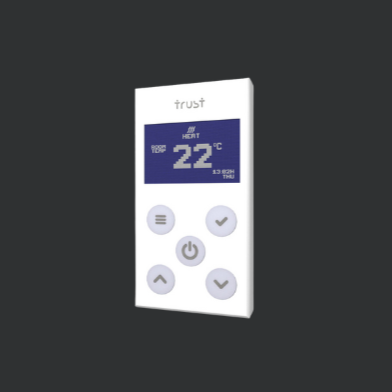
If you’re someone who is home often and prefers a ‘hands-on’ approach to heating control, a ProtoStat could be an adequate choice. Our ProtoStat has all the smart technology but is easier to control for anyone who just wants a simple heating solution. The straightforward thermostat means it’s easier to interact with this technology, stopping frustration when adjusting settings. The ProtoStat includes larger buttons, bold icons, along with a backlit display to make it easy to use for everyone.
The Wireless Thermostat
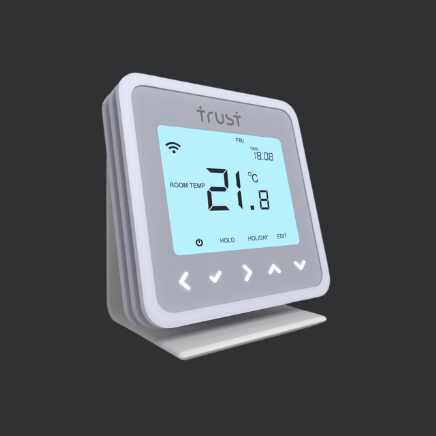
If you’re someone who is looking for wireless control over all their electrical radiators and their heaters, the wireless thermostat is for you. Our NEOS wireless thermostat allows you to control all your electric heaters and radiators through one control and offers a more advanced selection for those who like to align their heating with their schedules.
App-Controlled Thermostat
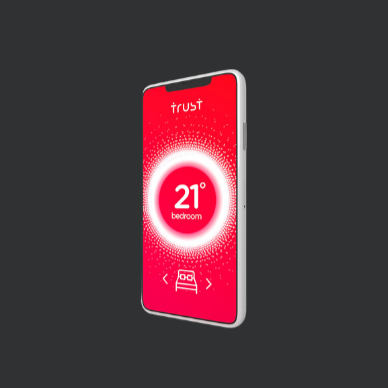
For tech-savvy individuals or those with unpredictable schedules. If you’re often away from home or prefer the convenience of controlling your heating remotely, an app-controlled thermostat offers the ultimate in flexibility and control.
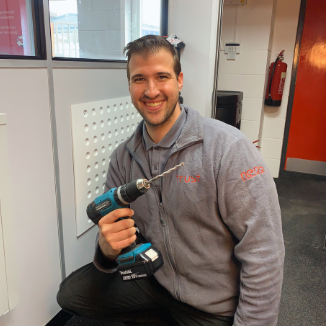
Even with all the research, reviews, and recommendations at your disposal, the expertise of a qualified heating engineer can be invaluable when it comes to choosing the right electric radiator for your home. Here’s why:
Personalised Recommendations: A heating engineer can assess your specific needs and recommend a radiator that is appropriately sized and featured for your home.
Cost-Benefit Analysis: An expert can provide insights into the long-term operational costs associated with different models, helping you make a more informed financial decision.
Technical Guidance: From understanding kilowatt ratings to selecting the ideal thermostat, a heating engineer can demystify technical jargon and guide you through the purchasing process.
Installation Advice: Different radiators have different installation requirements. An expert can advise on what will be involved in the installation process of smart electric radiators, including any prior work that may be needed.
Why leave your comfort and financial investment to chance? If you’re considering purchasing an electric radiator, book a consultation with one of our certified heating advisors today. You’ll gain personalised, professional advice tailored to your specific needs, ensuring that you make a decision you’re happy with for years to come.
Tags: Tips, General Guides.

If you are considering electric heating/electric radiators, then this guide tells you everything you need to know. Discover this modern, sustainable and economical method of heating that gives you complete control and comfort. Download Free Guide now.

*Trust Electric Heating needs the contact information you provide to us to contact you about our products and services. You may unsubscribe from these communications at any time. For information on how to unsubscribe, as well as our privacy practices and commitment to protecting your privacy, check out our Privacy Policy.
Quick installation and a 100 day warmth guarantee. Whether you’re buying one or several radiators, if our radiators don’t heat your room to a minimum of 20 degrees we will undertake to upgrade or replace the radiators free of charge.
Book your free consultation